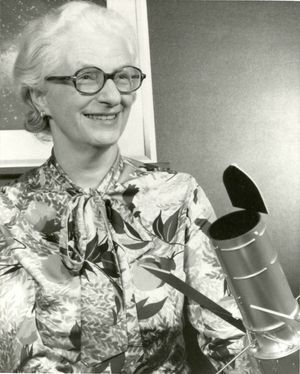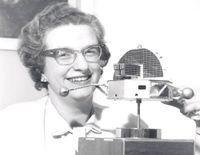2025 Nancy Grace Roman Award Recipient

The 2025 Nancy Grace Roman Award from the Astronomical Society of the Pacific (ASP) is awarded to Laura Lopez, Professor at The Ohio State University (OSU) for her transformative efforts on diversity and inclusion through advocacy and mentoring of students.
San Francisco, California – September 10, 2025 - Named for an icon in the history of astronomy research and space exploration, ASP’s Nancy Grace Roman Award was introduced in 2023 to recognize an individual or group for significant contributions to promoting gender equity and inclusion in astronomy and related fields. The 2025 Nancy Grace Roman Award goes to Dr. Laura Lopez not just for her undeniable dedication as a leader in the study of supernova remnants and massive star feedback processes in galaxies, but also her dedication to promoting gender equity and inclusion in astronomy and her vigorous support to students from historically marginalized groups.
Prof. Lopez membership and as current co-Chair of the Committee on the Status of Minorities in Astronomy (CSMA) and her 10 years as an active member of the American Astronomical Society (AAS) has led to her significant role in introducing initiatives to increase gender and minority representation and retention in all levels of astronomy. Her work at OSU includes being a faculty sponsor of BlackinAstro, a national initiative to amplify the experiences and accomplishments of Black students and researchers in space-related fields. She also supports OSU’s Polaris mentorship program and as one nominator professes, “by launching new leaders into our community and by stewarding these programs, Prof. Lopez multiplicatively increases her already very large impact.”
Prof. Lopez is also a researcher focusing on the complex web of interactions between star formation in galaxies, the massive stars this process produces, and the feedback of massive stars on the star formation process. While many astronomers spend their careers studying one of the ultraviolet, optical, infrared, radio, gamma-ray, or X-ray bands, Lopez employs them all using them to provide physical constraints on the systems she investigates. She is also a highly decorated teacher, lecturing, broadcasting, and writing widely and explaining complex concepts with clarity.
Directly advising and mentoring to support students from historically marginalized groups in STEM, Prof. Lopez has trained graduate and undergraduate postdocs, many who have been awarded prestigious postdoctoral and faculty positions at many highly regarded programs in the world. Her research, scientific leadership, and contributions to inclusion and equity have been recognized with many prestigious awards, most notably being named a Fellow of the American Astronomical Society for extensive contributions to advancing equity and inclusion in astronomy and physics through transformative mentorship programs and for nearly 20 years of national leadership in the AAS. Summarized by one nominee, Lopez “is an exceptional scientist, a celebrated and transformative mentor to students and postdocs, and a trailblazing leader for women and historically marginalized groups in astrophysics.”
Join us in celebration of Laura Lopez’s achievements at the in-person ASP Awards Gala on Saturday, November 8, 2025 at the Hilton San Francisco Airport Bayfront, Burlingame, CA.
Nancy Grace Roman Award for Promoting Gender Equity
Introduced in 2023 to award an individual or group for their significant contributions for promoting gender equity and inclusion in astronomy and related fields
-
The Nancy Grace Roman Award will next be given in 2027.
Please contact our Awards team if you have questions about the nomination process.
About Nancy Grace Roman

Nancy Grace Roman was an icon in the history of astronomy research and space exploration. She was often called “mother” of the Hubble Space Telescope for her work in spearheading its development. Roman was also a vocal advocate for encouraging girls to participate in STEM as well as a generous supporter of the ASP. Born in 1925, Roman loved astronomy from a very early age and credited her parent’s encouragement as the engine that fueled her lifelong passion for science by teaching her to observe birds, love nature, and observe the stars and locate constellations. By the time she was 11 years old, she had organized a weekly astronomy club for her girlfriends so she could share her knowledge about the night sky with them.
After completing an accelerated high school program, she earned a degree in astronomy from Swarthmore College in 1946, followed by a doctorate in astronomy from the University of Chicago in 1949. Ten years later, Nancy Grace Roman became the first woman to hold an executive position at NASA, overseeing a new “program for space astronomy.” NASA itself was a new government agency, and in her position Dr. Roman toured the country to talk to the nation’s research astronomers, find out what they wanted to study, and then convince them to consider the many advantages of collecting their data from space.
In the years that followed, Dr. Roman planned many of the highly successful programs and experiments for NASA’s space missions, including SpaceLab, Gemini, Apollo, and Skylab. In 1979, NASA felt ready to develop a program to launch a large and versatile space-based telescope. Dr. Roman was hired by the agency to plan and campaign for this new generation of telescope, helping NASA pitch the project to a variety of skeptical government agencies, including Congress. Dr. Roman’s passionate advocacy is credited for the launch of the Hubble Space Telescope in 1990, the instrument that for decades has provided the research community with images and data that has fundamentally transformed humanity’s understanding of the cosmos.

About the Nancy Grace Roman Award
In honor of Nancy Grace Roman, who spearheaded the development of the Hubble Space Telescope and was a generous benefactor of the Society, the ASP introduces the inaugural Nancy Grace Roman Award in 2023 for significant contributions to promoting gender equity and inclusion in astronomy and related fields. The award celebrates the achievements of individuals, groups, or organizations working to encourage participation in astronomy and related fields by people traditionally or currently excluded from these fields because of their gender, including girls, women, and transgender, non-binary, and gender non-conforming people.
Goals of the Nancy Grace Roman Award:
- To honor Nancy Grace Roman for her accomplishments and contributions to astronomy
- To honor and elevate the profiles any outstanding individuals, groups, and organizations who have contributed significantly to promoting gender equity and inclusion in astronomy
- To build, grow and sustain gender equity and inclusion among ASP’s global astronomical community
- To encourage other individuals, groups, and organizations to support gender equity and inclusion in the field
- To support ASP’s mission to use astronomy as a gateway to science for all

